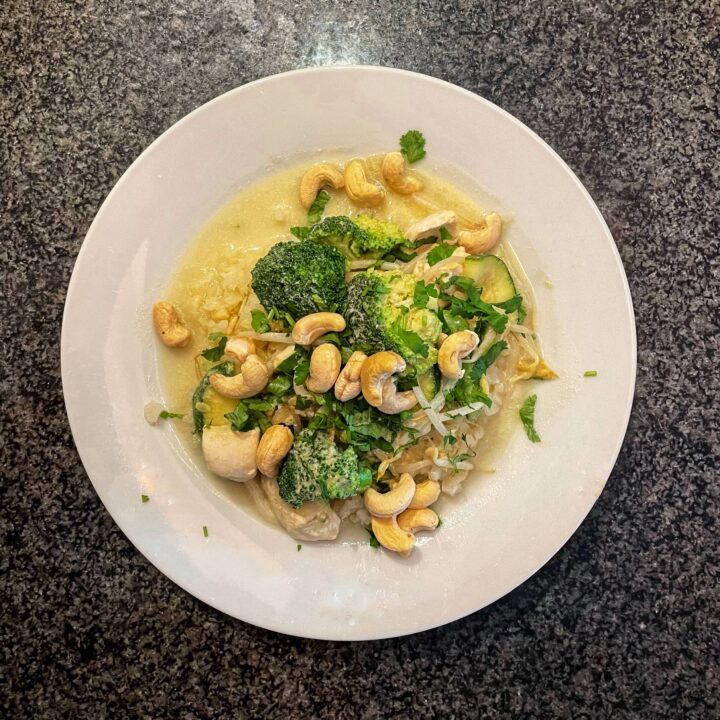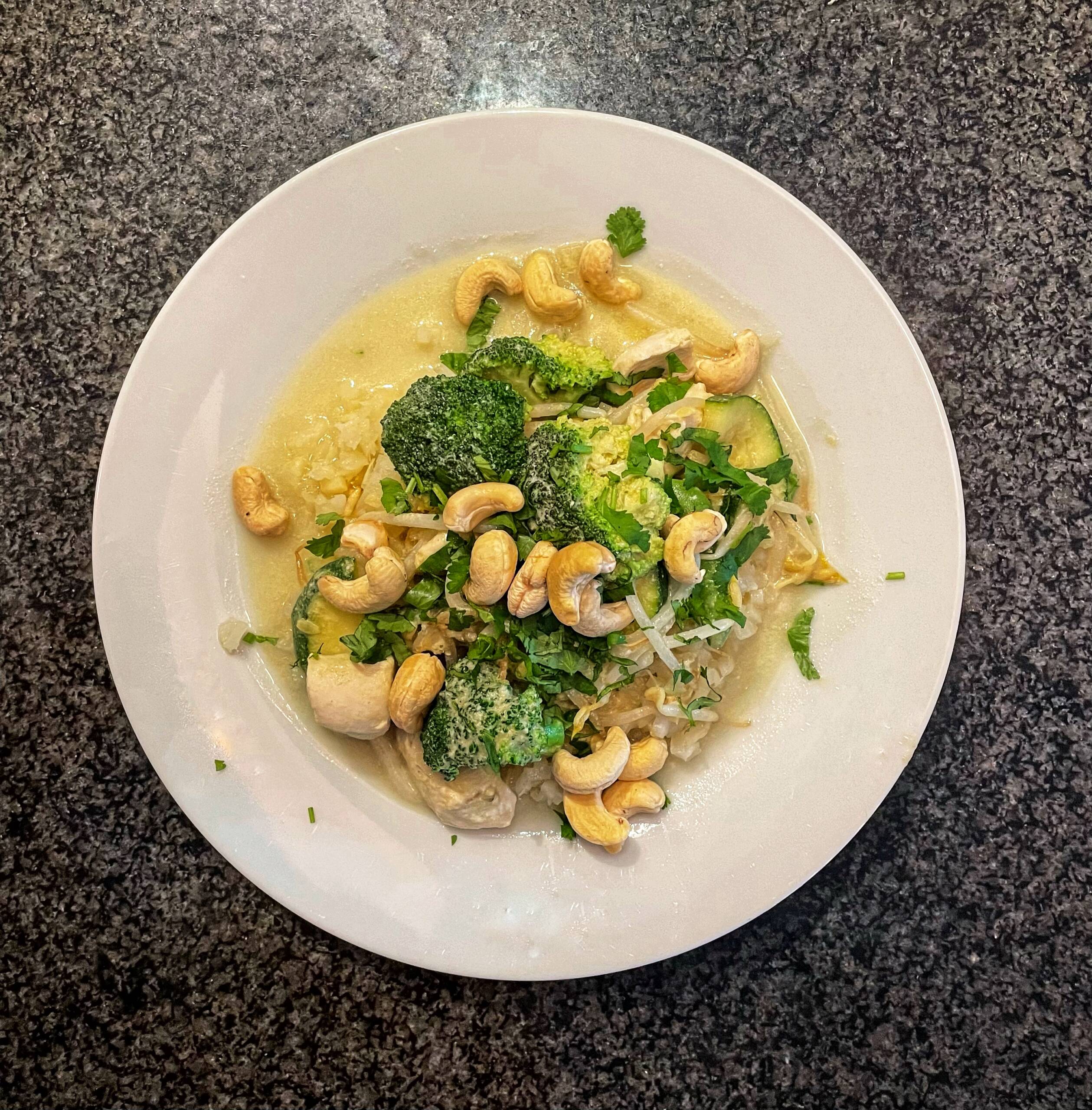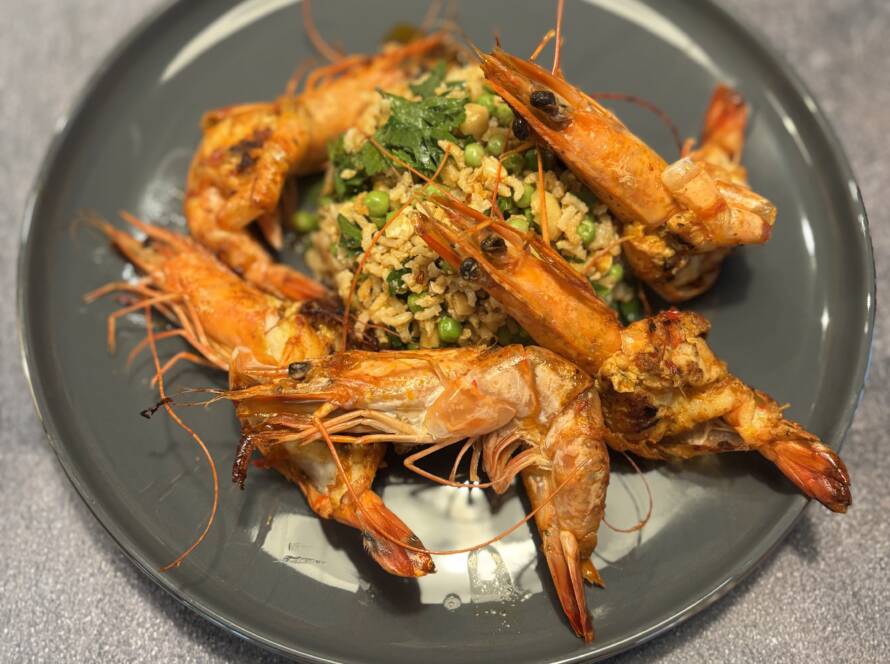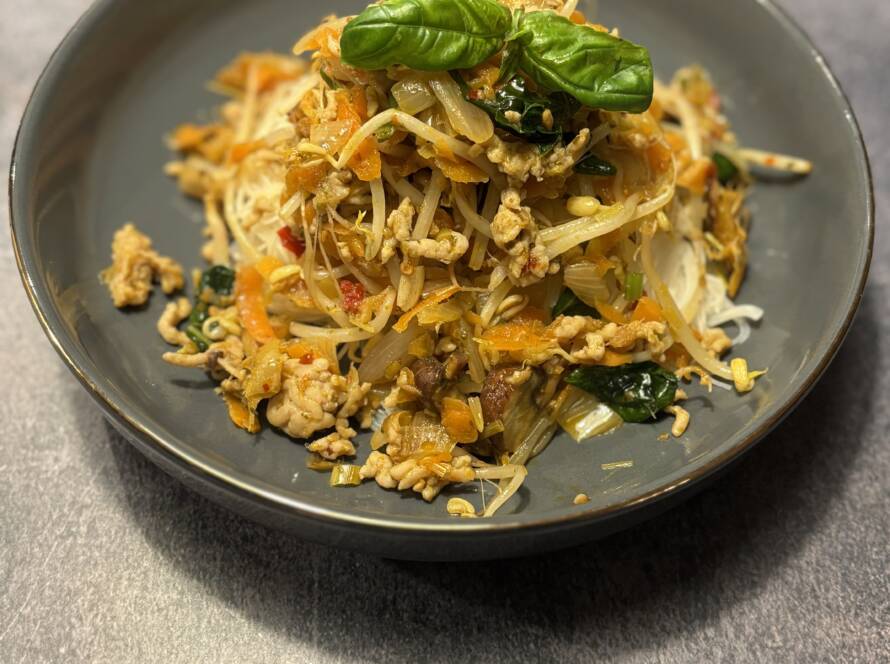
Thai Green Chicken Curry
A delicious and healthy low-carb Thai green curry that is packed with healthy, lean protein, vegetables and beneficial spices.
Ingredients
- 500g (17.6oz) skinless chicken pieces
- 500g (17.6oz or 2 cups) coconut milk
- 800g (28oz or 6 cups) cauliflower rice
- 1 large courgette - sliced
- 1 large head of broccoli (300g/11oz)
- 250g (8.8oz or 2 cups) sugar snap peas
- 125g (4.4oz or ⅔ cup) mung bean sprouts
- 120g (4.2oz or 1 cup) raw, unsalted cashews
- 70g (2.5oz) Thai green curry paste (gluten-free)
- 100g (3.5oz or 1 cup) chopped shallots
- 4 cloves of garlic
- 2 tbsp fish sauce
- 1 tbsp coriander leaves finely chopped
- 2 tbsp virgin coconut oil
- 100ml (3.4 fl oz or ⅓ cup) boiled water
Instructions
- Mince the garlic and set aside for 10 minutes
- In a wok, heat the coconut oil, add the shallots and curry paste and fry for 5 minutes on medium heat.
- Add the coconut milk, garlic, fish sauce and courgette and simmer for 5 minutes, then add the rest of the vegetables and the chicken, and simmer for another 5-10 minutes until the chicken is cooked.
- Boil the cauliflower rice in 100ml of water for 5 minutes and drain
- Serve the Thai curry on a bed of cauliflower rice, sprinkled with cashew nuts and chopped coriander leaves.
Notes
This is a delicious and healthy low-carb curry, that supplies 3 portions of vegetables and 28.2g of protein per bowl. Traditionally served with jasmine rice, I have replaced this with cauli-rice to reduce the carbohydrate content and increase the vegetable portions and nutritional profile. Where possible use organic ingredients and try use cold-pressed, extra-virgin organic, coconut oil, which is a healthier oil to use when cooking at higher temperatures and has a great, delicate flavour. Although coconut oil is considered a saturated fat, it contains mainly lauric acid, which is a medium chain fatty acid that is differently metabolised compared to animal saturated fats, and has been shown to raise the good cholesterol HDL ¹ ² ³ ⁴.
¹ Khaw KT, Sharp SJ, Finikarides L et al. Randomised trial of coconut oil, olive oil or butter on blood lipids and other cardiovascular risk factors in healthy men and women. BMJ Open. 2018;8(3).
² Chinwong S, Chinwong D, Mangklabruks A. Daily Consumption of Virgin Coconut Oil Increases High-Density Lipoprotein Cholesterol Levels in Healthy Volunteers: A Randomized Crossover Trial. Evid Based Complement Alternat Med. 2017;2017:7251562.
³ Schwingshackl L, Bogensberger B, Benčič A et al. Effects of oils and solid fats on blood lipids: a systematic review and network meta-analysis. J Lipid Res. 2018 Sep;59(9):1771-1782.
⁴ Vijayakumar M, Vasudevan DM, Sundaram KR, Krishnan S, Vaidyanathan K, Nandakumar S, Chandrasekhar R, Mathew N. A randomized study of coconut oil versus sunflower oil on cardiovascular risk factors in patients with stable coronary heart disease. Indian Heart J. 2016 Jul-Aug;68(4):498-506. doi: 10.1016/j.ihj.2015.10.384. Epub 2016 Jan 13. PMID: 27543472; PMCID: PMC4990731.Approximate micronutrient info per serving:
Vitamins
B1 (Thiamine) - 0.3mg (25%)
B2 (Riboflavin) - 0.3mg (27%)
B3 (Niacin) - 9.4mg (67%)
B5 (Pantothenic Acid) - 1.9mg (38%)
B6 (Pyridoxine) - 0.9mg (71%)
B12 (Cobalamin) - 0.2µg (10%)
Folate - 137µg (34%)
Vitamin A - 56.9µg (8%)
Vitamin C - 95.1mg (127%)
Vitamin D - 3.1IU (1%)
Vitamin E - 1.3mg (9%)
Vitamin K - 88.7µg (99%)
Minerals
Calcium - 97.5mg (10%)
Copper - 0.6mg (63%)
Iron - 3.5mg (19%)
Magnesium - 119.2mg (37%)
Manganese - 0.9mg (52%)
Phosphorus - 355.8mg (51%)
Potassium - 951.8mg (37%)
Selenium - 21.1µg (38%)
Sodium - 679.0mg (45%)
Zinc - 2.7mg (33%)
% RDI based on an adult female
Nutrition Information:
Yield: 8 Serving Size: 399g (13.5oz)Amount Per Serving: Calories: 418kcalTotal Fat: 25.1gNet Carbohydrates: 17.2gFiber: 5.7gProtein: 28.2g



